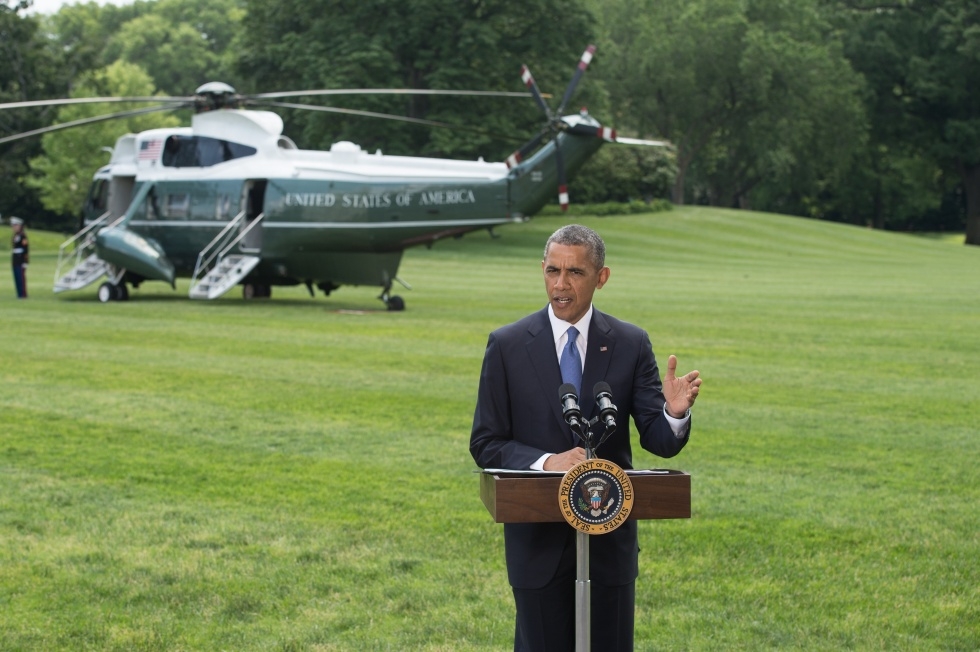Obama delivers 'wake up call' to Iraqi leaders as battle unfolds

US President Barack Obama said Friday that he is examining options short of sending ground troops to help Iraq counter a Sunni extremist offensive, but warned the country must heal its own divisions.
"We will not be sending US troops back into combat in Iraq, but I have asked my national security team to prepare a range of other options that could help support Iraqi security forces," Obama said.
Iraqi Prime Minister Nuri al-Maliki's government has asked the United States to provide military assistance to counter a stunning advance by ISIL, a Sunni extremist movement.
But, in brief remarks to reporters at the White House, Obama repeatedly stressed the "enormous sacrifices" that the US had made in Iraq and warned the Baghdad government that it had brought disaster on itself by failing to heal the divides in the country between Sunni and Shiite camps.
"We won't allow ourselves to be dragged back into a situation in which while we're there we're keeping a lid on things and, after enormous sacrifices by us, as soon as we're not there, suddenly people end up acting in ways that are not conducive to the long-term stability of the country."
The United States withdrew the last of its occupation forces from Iraq in 2011, eight years after they overthrew the then dictator Saddam Hussein, but Obama sad he was studying options to increase ongoing support for the Iraqi military.
He added, however, that "any action that we may take to provide assistance to Iraqi security forces has to be joined by a serious and sincere effort by Iraq's leaders to set aside sectarian differences.
"Nobody has an interest in seeing terrorists gain a foothold inside of Iraq and nobody is going to benefit from seeing Iraq descend into chaos," he said.
"So the United States will do our part, but understand that ultimately it's up to the Iraqis as a sovereign nation to solve their problems."
Toby Dodge, director of the London School of Economics' Middle East Centre, called Obama's statement "warm words without much capacity."
"The United States has never been able to force Maliki to reform," Dodge said. "They didn't at the peak of reform in 2007, leaving him untouched, and they backed him in 2010."
Dodge's comments echo the picture painted in a recent New Yorker article in which American officials say they were frequently at odds with Maliki, but seemingly hamstrung to remove their support.
"In time," writes Dexter Filkins, "Maliki either ignored or jettisoned every promise. 'He looked us straight in the eyes and lied,' the former [American] diplomat told me."
Others, however, lamented a perceived lack of direct action by the American administration.
"It's typical of Obama, he has opted for a no action policy just as he did in Syria," said Abdulkhaleq Abdulla, professor of political science at the Emirates University. "He is turning his back on Iraq in times of need and desperation."
"This will reinforce the perception of the 'unreliable US' among its friends in the region and Iran will be more than happy to take the lead in Iraq, as it has done in Syria," he added.
Haydar al-Khoei, an associate fellow at Chatham House, questioned why Obama failed to mention the "seemingly endless supply of funds" to terrorist groups flowing from US allies, namely Saudi Arabia, Kuwait and Qatar.
"The US understands the danger that the funding of terrorism from these states poses," al-Khoei said, "but there seems to be very little political will to put more pressure on their allies in the Gulf to stop these funds from flowing."
A senior Iraqi official quoted by the New York Times on Friday criticised the Obama administration for its response thus far to the crisis and claimed his country might be forced to turn to Iran for help.
"If you're in an antique shop, there's a sign: 'If you broke it, you bought it,'" the official was quoted as saying. "I am not saying the Americans are responsible for everything, but they did not leave a well-trained army and they left us without any real air support, and the Obama administration really shares much of the blame."
Other highlights of Obama's speech on Friday:
- The crisis in Iraq is "not solely or primarily a military challenge", but rather also reflects a serious political problem:
"Military actions by the US or by any outside nation are not going to solve those problems over the long run," he said. "The fact that [Iraqi troops] are not willing to stand and fight their posts against admittedly hardened terrorists . . . indicates that there is a problem with morale and commitment and, ultimately, that is rooted in the political problems that have plagued the country for a long time."
- Obama raised concerns about attacks on US soil as a result of the current fighting in Iraq.
"Iraqi security forces have proven unable to defend a number of cities, which has allowed the terrorists to overrun a part of Iraq's territory," Obama said. "And this poses a danger to Iraq and its people, and given the nature of these terrorists, it could pose a threat eventually to American interests as well."
- Obama and his national security advisors will take "several days" to decide what strategy the US will take.
"People should not anticipate an overnight response," he said.
New MEE newsletter: Jerusalem Dispatch
Sign up to get the latest insights and analysis on Israel-Palestine, alongside Turkey Unpacked and other MEE newsletters
Middle East Eye delivers independent and unrivalled coverage and analysis of the Middle East, North Africa and beyond. To learn more about republishing this content and the associated fees, please fill out this form. More about MEE can be found here.

